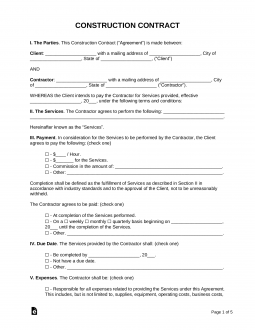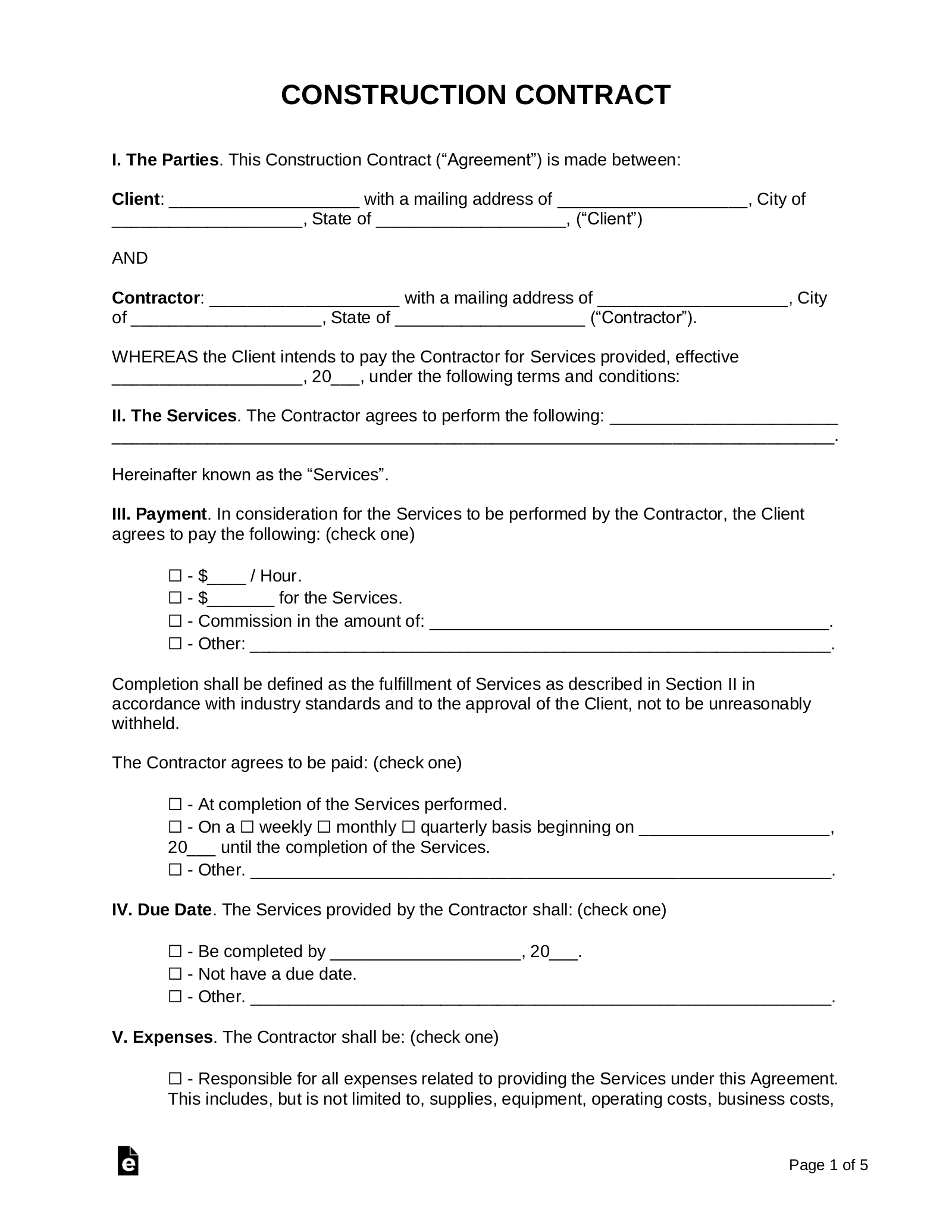Updated September 21, 2023
A construction contract is used by a client seeking to build or remodel a property with the hired help of a general contractor. The agreement will detail the general contractor’s scope of work, including payment and rights to subcontract any of the tasks involved in completing the construction. If there are any work orders or plans, they should be attached to the agreement in addition to any permits needed to begin work.
Table of Contents |
4 Types of Construction Contracts
1. Fixed Price
A price is given for the services provided. This is a lump sum that covers all materials and labor.
2. Cost Plus
The client agrees to pay “at cost” for the contractor’s materials, labor, and any other expenses. The contractor will profit by being paid a percentage of the total costs or a fixed fee. The client may also add a clause stating the total construction costs may not breach a specific amount.
3. Time and Material
The client pays the contractor for materials and labor at a negotiated rate. The contractor makes a profit by charging the client more than what they pay their staff.
4. Unit Pricing
If the client is seeking to have the contract set up in a per square foot ($/SF) or another unit of measurement.
How to Start a Construction Project (6 steps)
- Budget and Scheduling
- Generate and Refine Design Concepts
- Obtain Local Permits
- Find the Construction Contractor
- Write the Contractor Agreement
- Construction Payments
This roadmap is for clients and the contractor alike to help determine where the project currently stands and what items are outstanding for it to be completed. Although, every project is unique the following guide may be able to assist in planning a construction project.
1. Budget and Scheduling
 Decide the budget for the project and decide when it’s best to have construction begin. For those living in northern areas of the United States, it may be best to have the construction occur during the summer months due to costs being more affordable. Establishing a budget is the best way to meet with an architect, designer, or project manager to determine what can be accomplished and what materials may be available.
Decide the budget for the project and decide when it’s best to have construction begin. For those living in northern areas of the United States, it may be best to have the construction occur during the summer months due to costs being more affordable. Establishing a budget is the best way to meet with an architect, designer, or project manager to determine what can be accomplished and what materials may be available.
2. Generate and Refine Design Concepts
 Create design concepts with the third (3rd) party working on the project. It’s recommended to request a few design layouts and to refine the client’s needs over the process. Whenever working in a finite budget or limited space, there will always be sacrifices that are made to satisfy the entire project.
Create design concepts with the third (3rd) party working on the project. It’s recommended to request a few design layouts and to refine the client’s needs over the process. Whenever working in a finite budget or limited space, there will always be sacrifices that are made to satisfy the entire project.
3. Obtain Local Permits
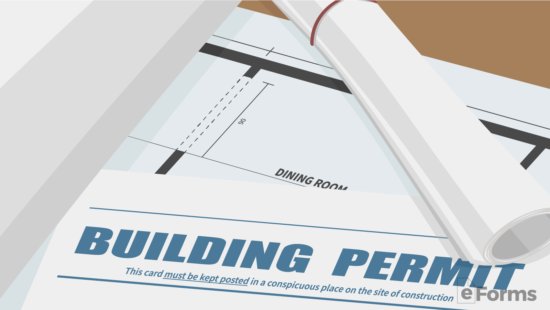 Whether it’s a home, apartment, or condominium, chances are the project will need to be approved by a local government or, for condos, the condominium association. Bring the final plans and submit while requesting a building permit that allows the construction to occur for a period of time, usually 6 to 24 months depending on the construction.
Whether it’s a home, apartment, or condominium, chances are the project will need to be approved by a local government or, for condos, the condominium association. Bring the final plans and submit while requesting a building permit that allows the construction to occur for a period of time, usually 6 to 24 months depending on the construction.
4. Find the Construction Contractor
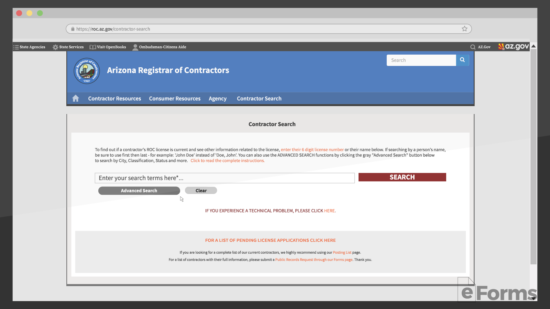 During the permitting period, it is best to begin the search for the construction contractor. In most cases, word-of-mouth or recommendation from those in the community will direct someone to the best contractor in the area. Otherwise, websites like Yelp do a good job of acting as a directory for someone to call and seek requests for bids while interviewing them to see if they fit the role for the work.
During the permitting period, it is best to begin the search for the construction contractor. In most cases, word-of-mouth or recommendation from those in the community will direct someone to the best contractor in the area. Otherwise, websites like Yelp do a good job of acting as a directory for someone to call and seek requests for bids while interviewing them to see if they fit the role for the work.
Verify a General Contractor
A general contractor must be registered with the State if they are to accept work for residential and commercial projects. Use the links below to verify the individual is authorized to practice in the State:
- Alabama
- Alaska
- Arizona
- Arkansas
- California
- Colorado
- Connecticut
- Delaware
- Florida
- Georgia
- Hawaii
- Idaho
- Illinois
- Indiana
- Iowa
- Kansas
- Kentucky
- Louisiana
- Maine
- Maryland
- Massachusetts
- Michigan
- Minnesota
- Mississippi
- Missouri
- Montana
- Nebraska
- Nevada
- New Hampshire
- New Jersey
- New Mexico
- New York
- North Carolina
- North Dakota
- Ohio
- Oklahoma
- Oregon
- Pennsylvania
- Rhode Island
- South Carolina
- South Dakota
- Tennessee
- Texas
- Utah
- Vermont
- Virginia
- Washington
- West Virginia
- Wisconsin
- Wyoming
5. Write the Contractor Agreement
 At this time it’s best for the client and the contractor that they’ve selected to go over the bid and finalize the scope of work and enter into a contract for the construction. The client should utilize an attorney to ensure that all aspects of the work are protected in the chance it’s not completed in accordance with the plans and budget.
At this time it’s best for the client and the contractor that they’ve selected to go over the bid and finalize the scope of work and enter into a contract for the construction. The client should utilize an attorney to ensure that all aspects of the work are protected in the chance it’s not completed in accordance with the plans and budget.
6. Construction Payments
 If the project is new construction or if the project is sizable (lasting more than 2-3 months) the contractor will demand that they are paid overtime or at certain “checkpoints”. The client is responsible for ensuring that the project is going accordingly and, if certain parameters are being met, to make payment.
If the project is new construction or if the project is sizable (lasting more than 2-3 months) the contractor will demand that they are paid overtime or at certain “checkpoints”. The client is responsible for ensuring that the project is going accordingly and, if certain parameters are being met, to make payment.
For smaller construction jobs, payment is administered upon completion.
Sample Construction Contract
CONSTRUCTION CONTRACT
I. The Parties. This Construction Contract (“Agreement”) is made between:
Client: [CLIENT’S NAME] with a mailing address of [ADDRESS], City of [CITY], State of [STATE], (“Client”)
AND
Contractor: [CONTRACTOR’S NAME] with a mailing address of [ADDRESS], City of [CITY], State of [STATE] (“Contractor”).
WHEREAS the Client intends to pay the Contractor for Services provided, effective [DATE, YEAR], under the following terms and conditions:
II. The Services. The Contractor agrees to perform the following: [DESCRIPTION].
Hereinafter known as the “Services”.
III. Payment. In consideration for the Services to be performed by the Contractor, the Client agrees to pay the following: (check one)
☐ – $[AMOUNT] / Hour.
☐ – $[AMOUNT] for the Services.
☐ – Commission in the amount of: [AMOUNT].
☐ – Other: [DESCRIPTION].
Completion shall be defined as the fulfillment of Services as described in Section II in accordance with industry standards and to the approval of the Client, not to be unreasonably withheld.
The Contractor agrees to be paid: (check one)
☐ – At completion of the Services performed.
☐ – On a ☐ weekly ☐ monthly ☐ quarterly basis beginning on [DATE] until the completion of the Services.
☐ – Other. [DESCRIPTION].
IV. Due Date. The Services provided by the Contractor shall: (check one)
☐ – Be completed by [DATE].
☐ – Not have a due date.
☐ – Other. [DESCRIPTION].
V. Expenses. The Contractor shall be: (check one)
☐ – Responsible for all expenses related to providing the Services under this Agreement. This includes, but is not limited to, supplies, equipment, operating costs, business costs, employment costs, taxes, Social Security contributions/payments, disability insurance, unemployment taxes, and any other cost that may or may not be in connection with the Services provided Contractor.
☐ – *Reimbursed for the following expenses that are attributable directly to the Services performed under this Agreement: [DESCRIPTION].
*The Client will be required to pay the Contractor within thirty (30) days of any Expense after receiving an itemized expense statement from the Contractor. Upon request by the Client, the Contractor may have to show any receipt(s) or proof of purchase for said Expense(s).
VI. Liability Insurance (Minimum ($) Amount). The Contractor agrees to bear all responsibility for the actions related to themselves and their employees or personnel under this Agreement. In addition, the Contractor agrees to obtain comprehensive liability insurance coverage in case of bodily or personal injury, property damage, contractual liability, and cross-liability (“Liability Insurance”).
The minimum amount ($) for the Liability Insurance shall: (check one)
☐ – Be a minimum amount of combined single limit of $[AMOUNT].
☐ – Not have a minimum amount required.
VII. Termination. This Agreement shall terminate upon the: (check one)
☐ – Completion of the Services provided.
☐ – Date of [DATE].
☐ – Other. [DESCRIPTION].
In addition, the Client or Contractor may terminate this Agreement, and any obligations stated hereunder, with reasonable cause by providing written notice of a material breach of the other party; or any act exposing the other party to liability to others for personal injury or property damage.
VIII. Option to Terminate. The Client and Contractor shall: (check one)
☐ – Have the option to terminate this Agreement at any time by providing [#] days’ written notice.
☐ – Not have the option to terminate this Agreement unless there is reasonable cause, as defined in Section VII.
IX. Independent Contractor Status. The Contractor, under the code of the Internal Revenue Service (IRS), is an independent contractor, and neither the Contractor’s employees or contract personnel are, or shall be deemed, the Client’s employees.
X. Business Licenses, Permits, and Certificates. The Contractor represents and warrants that all employees and personnel associated shall comply with federal, state, and local laws requiring any required licenses, permits, and certificates necessary to perform the Services under this Agreement.
XI. Federal and State Taxes. Under this Agreement, the Client shall not be responsible for: Withholding FICA, Medicare, Social Security, or any other federal or state withholding taxes from the Contractor’s payments to employees or personnel or make payments on behalf of the Contractor; Make federal or state unemployment compensation contributions on the Contractor’s behalf.
XII. Benefits of Contractor’s Employees. The Contractor understands and agrees that they are solely responsible for shall be liable to all benefits that are provided to their employees, including but not limited to, retirement plans, health insurance, vacation time-off, sick pay, personal leave, or any other benefit provided.
XIII. Unemployment Compensation. The Contractor shall be solely responsible for the unemployment compensation payments on behalf of their employees and personnel. The Contractor shall not be entitled to unemployment compensation in connection with the Services performed under this Agreement.
XIV. Workers’ Compensation. The Contractor shall be responsible for providing all workers’ compensation insurance on behalf of their employees. If the Contractor hires employees to perform any work under this Agreement, the Contractor agrees to grant workers’ compensation coverage to the extent required by law. Upon request by the Client, the Contractor must provide certificates proving workers’ compensation insurance at any time during the performance of the Service.
XV. Indemnification. The Contractor shall indemnify and hold the Client harmless from any loss or liability from performing the Services under this Agreement.
XVI. Confidentiality. The Contractor acknowledges that it will be necessary for the Client to disclose certain confidential and proprietary information to the Contractor in order for the Contractor to perform their duties under this Agreement. The Contractor acknowledges that disclosure to a third party or misuse of this proprietary or confidential information would irreparably harm the Client.
XVII. Proprietary Information. Proprietary information, under this Agreement, shall include:
The product of all work performed under this Agreement (“Work Product”) will be the sole property of the Client, and Contractor hereby assigns to the Client all right, title and interest therein. Contractor retains no right to use the Work Product and agrees not to challenge the validity of the Client’s ownership in the Work Product;
XVIII. No Partnership. This Agreement does not create a partnership relationship between the Client and the Contractor. Unless otherwise directed, the Contractor shall have no authority to enter into contracts on the Client’s behalf or represent the Client in any manner.
XIX. Assignment and Delegation. The Contractor may assign rights and may delegate duties under this Agreement to other individuals or entities acting as a subcontractor (“Subcontractor”). The Contractor recognizes that they shall be liable for all work performed by the Subcontractor and shall hold the Client harmless of any liability in connection with their performed work.
XX. Governing Law. This Agreement shall be governed under the laws in the State of [STATE].
XXI. Severability. This Agreement shall remain in effect in the event a section or provision is unenforceable or invalid. All remaining sections and provisions shall be deemed legally binding unless a court rules that any such provision or section is invalid or unenforceable, thus, limiting the effect of another provision or section. In such case, the affected provision or section shall be enforced as so limited.
XXII. Breach Waiver. Any waiver by the Client of a breach of any section of this Agreement by the Contractor shall not operate or be construed as a waiver of any subsequent breach by the Contractor.
XXIII. Additional Terms and Conditions. [DESCRIPTION].
XXIV. Entire Agreement. This Agreement, along with any attachments or addendums, represents the entire agreement between the parties. Therefore, this Agreement supersedes any prior agreements, promises, conditions, or understandings between the Employer and Employee.
Client’s Signature ______________________ Date: _______________
Print Name ______________________
Contractor’s Signature ______________________ Date: _______________
Company: ______________________
Print Name: ______________________
Related Agreements
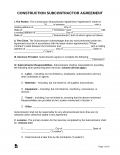 Construction Subcontractor Agreement – Between the contractor and any third (3rd) party, “subcontractor”, for any work that cannot be completed by the contractor such as an electrician, roofer, plumber, etc.
Construction Subcontractor Agreement – Between the contractor and any third (3rd) party, “subcontractor”, for any work that cannot be completed by the contractor such as an electrician, roofer, plumber, etc.
Download: PDF, MS Word, OpenDocument
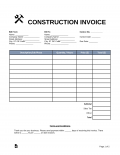 Construction Invoice – For a contractor to request payment from their client for services rendered.
Construction Invoice – For a contractor to request payment from their client for services rendered.
Download: PDF, MS Word, OpenDocument

